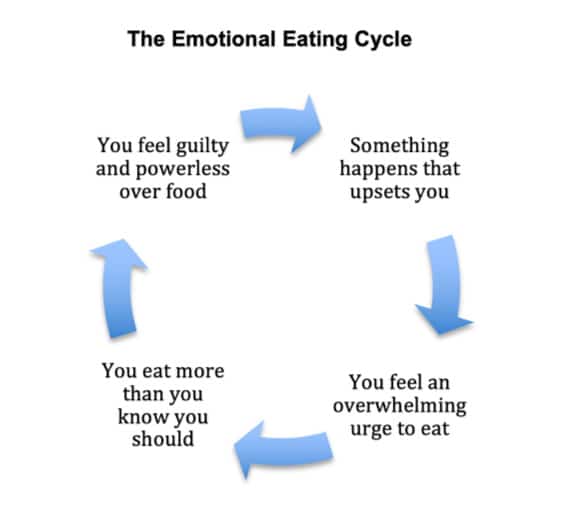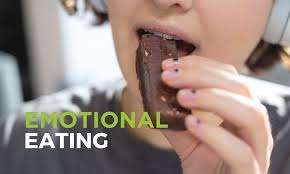When you are stressed, anxious, or feeling down, do you reach for that tub of ice cream or bag of chips?
You are not alone!
Emotional eating, often referred to as “stress eating,” is a common response to life’s challenges.
But can this habit be a hidden trigger behind obesity?
Let us unravel the connection between our emotions and our waistlines, backed by scientific research.
“Is Emotional Eating the Hidden Trigger Behind Obesity” Article Index:
- Introduction to Emotional Eating and Obesity
- What is Emotional Eating?
- How Emotional Eating Leads to Weight Gain
- The Role of Stress Eating in Obesity
- Emotions and Their Impact on Weight Gain
- Does Emotional Eating Always Lead to Obesity?
- FAQs on Emotional Eating and Weight Gain
- Strategies to Combat Emotional Eating and Prevent Obesity
- Conclusion: Is Emotional Eating Really to Blame?
Introduction to Emotional Eating and Obesity

What is Emotional Eating?
How Emotional Eating Leads to Weight Gain?
Emotional eating can easily lead to emotional weight gain because it is not driven by physical hunger but by emotional cravings.
Unlike eating when you are hungry, emotional eating often leads to overconsumption of unhealthy foods, which are typically high in calories and low in nutritional value.
This kind of eating behavior disrupts normal hunger cues, making it difficult to recognize when you’re full.
A study published in the Journal of Obesity found that individuals who engage in emotional eating are more likely to gain weight over time compared to those who eat based on hunger and fullness cues.
This weight gain is often exacerbated by a lack of physical activity, creating a recipe for obesity.
The Role of Stress Eating in Obesity
Stress eating and obesity are closely linked.
When stressed, the body releases cortisol, a hormone that can increase appetite and lead to cravings for comfort foods.
This “stress eating weight gain” can become a vicious cycle where stress leads to overeating, which then leads to weight gain, further increasing stress levels and cardiac overload.
Research shows that stress-induced eating is more prevalent in women than in men, suggesting a possible gender difference in how stress affects eating behaviors.
A study from the American Psychological Association revealed that nearly 40% of adults admit to overeating or eating unhealthy foods due to stress.
Emotions and Their Impact on Weight Gain
Emotional eating occurs when individuals consume food in response to their feelings rather than actual hunger.
Emotions such as sadness, loneliness, and boredom often trigger excessive food intake, leading people to seek comfort in food as a form of self-soothing or distraction.
While this might provide temporary relief, it can result in long-term challenges, including weight gain and associated health issues.
The Link Between Negative Emotions and Eating Habits:
When faced with negative emotions, many individuals turn to food, particularly items high in sugar, fat, or salt.
These “comfort foods” trigger the release of dopamine and opioids in the brain, creating pleasurable sensations that temporarily alleviate emotional distress.
According to research published in the journal Appetite, emotional eating is linked to increased cravings for high-calorie foods, particularly those rich in carbohydrates and fats.
However, this relief is often short-lived, leading to repeated consumption and potential overeating.
Impact on Weight and Health:
The cycle of using food to cope with emotions can contribute to significant weight gain over time.
A study published in Eating Behaviors found that individuals who eat in response to negative emotions are more likely to gain weight and struggle with weight management.
Emotional eaters tend to consume larger portions and make poorer food choices, which can lead to a higher body mass index (BMI) and an increased risk of obesity-related health issues.
Real-Life Example:
Consider Sarah, who experiences loneliness after moving to a new city.
To cope, she starts indulging in high-calorie snacks while watching TV. Initially, this habit provides comfort, but over months, she notices weight gain and decreased energy levels.
This example illustrates how emotional eating can become a coping mechanism that leads to unintended health consequences.
Breaking the Cycle:
Recognizing emotional eating patterns is the first step toward change. Some effective strategies include:
- Mindful Eating: Paying attention to hunger and fullness cues can help differentiate between physical hunger and emotional cravings.
- Alternative Coping Mechanisms: Engaging in activities like exercise, meditation, or hobbies can serve as healthier outlets for managing emotions.
- Professional Support: Consulting with healthcare professionals, such as dietitians or therapists, can provide personalized strategies to manage emotional eating.
By understanding the connection between emotions and eating habits, individuals can develop healthier coping mechanisms, leading to improved well-being and better weight management.

Does Emotional Eating Always Lead to Obesity?
It’s important to note that emotional eating does not lead to obesity in every case.
Genetics, metabolism, physical activity, and even the type of food consumed all play a role in determining whether emotional eating will result in weight gain.
For instance, someone who engages in emotional eating but also maintains a regular exercise routine may not gain weight as easily as someone who is sedentary.
Moreover, some people experience emotional eating and obesity as part of a broader pattern of disordered eating, which may include binge eating or restricting food intake.
These complex behaviors require different strategies and interventions.
FAQs on Emotional Eating and Weight Gain
Q-1: Why does stress make me reach for ultra-processed snacks instead of real food?
A-1: Stress narrows your focus to quick comfort and fast energy. Ultra-processed foods are engineered for speed—soft textures, strong flavors, easy chewing—so they “solve” the feeling faster than whole foods. Over time, your brain links relief with those items. A fix: pair a fast relief cue (60-second box breathing or a brief walk) with a planned, satisfying option (Greek yogurt + fruit, nuts + dark chocolate) to retrain that association.
Q-2: Is my “emotional hunger” actually tiredness or boredom in disguise?
A-2: Often. Emotional hunger arrives suddenly and targets a specific taste; physical hunger builds gradually and is flexible. A quick test: drink water, set a 10-minute timer, and do a light task (fold laundry, email sweep). If the craving dissolves or shifts, it was likely emotional. If it persists and remains flexible (“any decent meal will do”), it is probably physical—eat a real meal with protein and fiber.
Q-3: Why do I overeat at night even when I did “fine” all day?
A-3: Decision fatigue and solitude lower friction for grazing, while screens pair cues (ads, scrolling) with food reward. Also, under-eating protein earlier sets you up for evening cravings. Front-load your day: anchor breakfast and lunch with protein and produce, pre-portion an evening snack, and set a “kitchen closed” cue (make tea, brush teeth, lights dim) 60–90 minutes before bed.
Q-4: Can I stop emotional eating without banning favorite foods?
A-4: Yes—use “urge surfing” and stimulus design. Keep favorites, but make them deliberate: single-serve portions, eaten at a table, plate it, sit, no phone. When an urge hits, surf it for 90 seconds with slow breathing; most urges crest and fade. If it remains, have the portion you planned. This preserves autonomy while breaking the reflex loop.
Q-5: What’s one skill that measurably reduces emotional overeating?
A-5: Emotional granularity—naming the exact state (“restless,” “lonely,” “irritated,” not just “stressed”). Label → plan: restless = 5-minute walk; lonely = text a friend; irritated = 2-minute journal + shoulder rolls. Pair each emotion with a tiny action, then eat if still hungry. Over weeks, you’ll notice fewer “automatic” snacks and easier weight control without rigid rules.
Strategies to Combat Emotional Eating and Prevent Obesity
To tackle emotional eating and weight gain, it is essential to develop strategies that address both the emotional and physical aspects of eating.
Here are some evidence-based approaches:
- Mindful Eating: Being aware of why and what you’re eating can help break the cycle of emotional eating. Mindful eating encourages focusing on the sensory experience of eating and recognizing hunger and fullness cues.
- Stress Management: Since stress eating and obesity are linked, finding ways to manage stress is crucial. Techniques like meditation, exercise, and deep breathing can help reduce stress levels without resorting to food.
- Healthy Coping Mechanisms: Developing alternative ways to cope with emotions, such as journaling, talking to a friend, or engaging in a hobby, can reduce the reliance on food for comfort.
- Professional Support: If emotional eating is severe, seeking help from a therapist specializing in cognitive-behavioral therapy (CBT) can be beneficial. CBT has been shown to be effective in reducing emotional eating by helping individuals change their thought patterns and behaviors.
- Balanced Diet and Exercise: Maintaining a balanced diet and regular physical activity can counteract the effects of emotional eating. Even if you occasionally indulge, regular exercise such as push-ups can help mitigate weight gain.
Final Analysis: Is Emotional Eating Really to Blame?
So, is emotional eating the hidden trigger behind obesity?
The answer is both “yes” and “no”. While emotional eating certainly contributes to weight gain for many people, it’s not the sole factor.
As per leanandfit.info “Genetics, lifestyle, and even socioeconomic factors all play a role in the development of obesity”.
However, recognizing the impact of emotional eating is crucial for those struggling with weight management.
By addressing the emotional triggers of overeating and developing healthier coping mechanisms, consuming healthy smoothie recipes for weight loss, it is possible to break the cycle of emotional eating and obesity.
Ultimately, emotional eating may not be the entire story behind obesity, but it is a significant chapter that should not be overlooked.
References:
